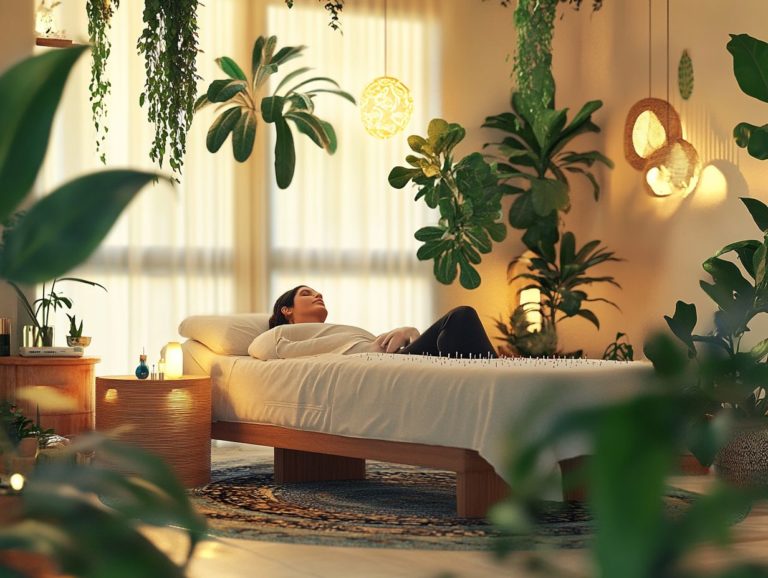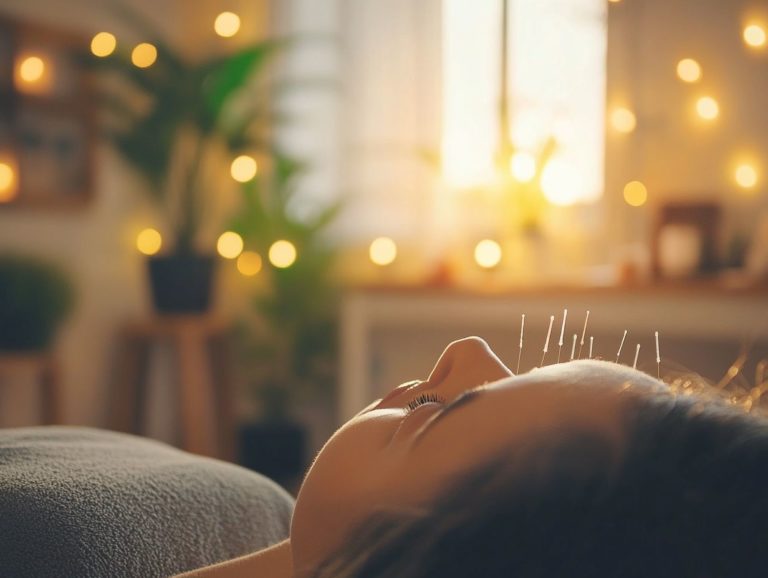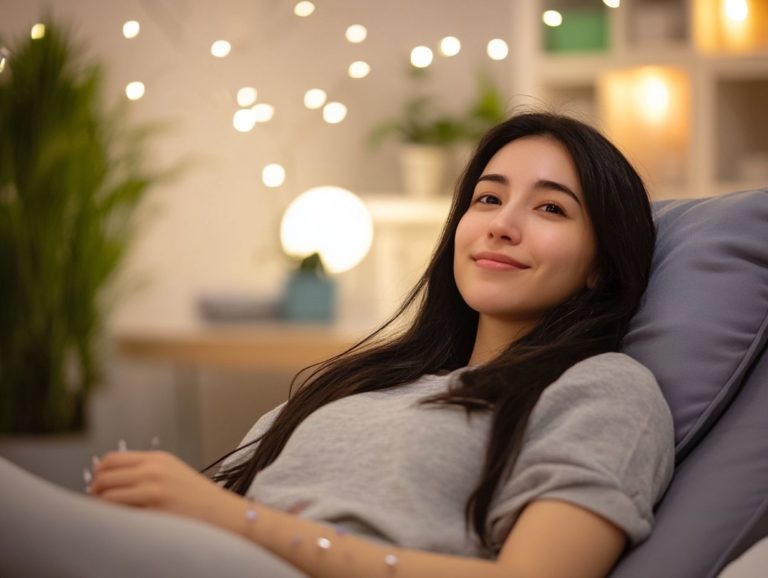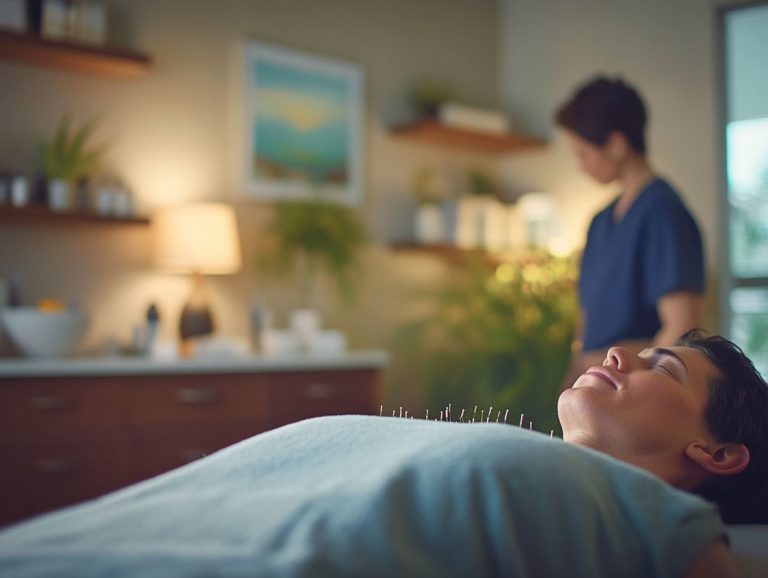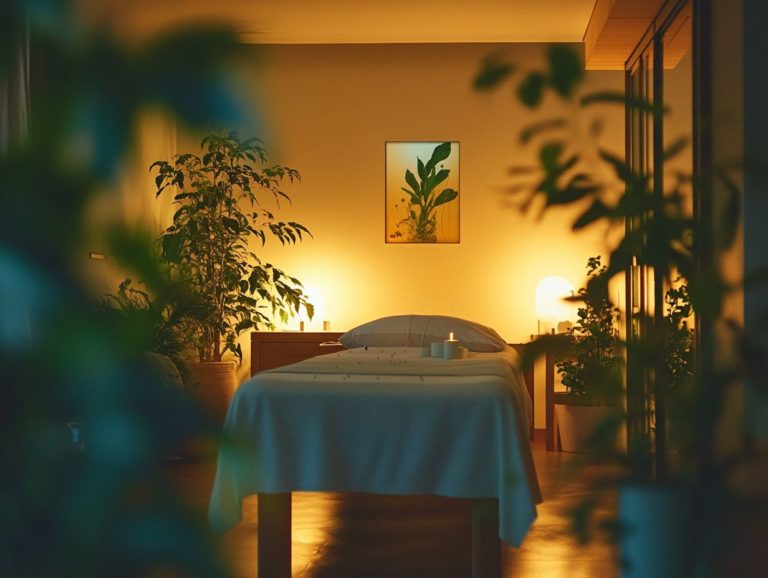Acupuncture for Anxiety: Can It Really Help?
Acupuncture has become quite the sought-after complementary therapy for a range of health concerns, especially anxiety.
Rooted deeply in Traditional Chinese Medicine, this ancient practice involves stimulating specific points on the body, promoting balance and overall well-being.
Discover how acupuncture can transform your approach to managing anxiety, uncover the science that supports its effectiveness, and learn what to expect during a session.
You’ll also want to find out how to select a qualified practitioner and explore ways to integrate acupuncture with other treatments for the best possible outcomes.
Whether you re simply curious or seriously considering it as a treatment option, this guide offers valuable insights into the potential benefits of acupuncture for relieving anxiety.
Contents
- Key Takeaways:
- Understanding Acupuncture
- How Acupuncture Works for Anxiety
- Evidence for Acupuncture’s Effectiveness
- Choosing an Acupuncturist
- What to Expect During an Acupuncture Session
- Combining Acupuncture with Other Treatments for Anxiety
- Frequently Asked Questions
- What is acupuncture and how does it work?
- Can acupuncture really help with anxiety?
- What are the potential benefits of using acupuncture for anxiety?
- Are there any risks or side effects associated with acupuncture?
- How many acupuncture sessions are typically needed to see results for anxiety?
- Is acupuncture covered by insurance for the treatment of anxiety?
Key Takeaways:
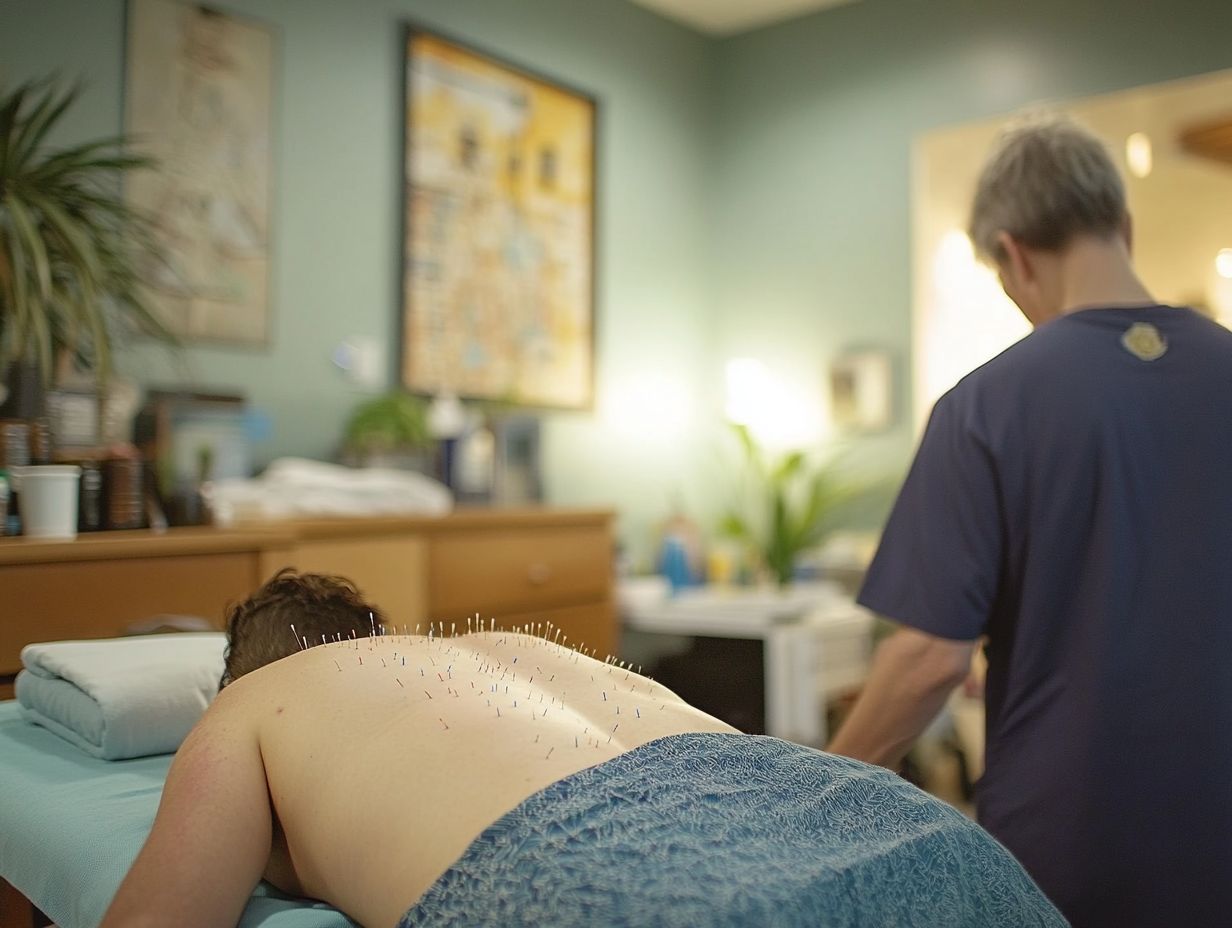
Acupuncture, a key component of Traditional Chinese Medicine, may offer relief for anxiety sufferers by regulating the nervous system. Research studies have shown promising results for the effectiveness of acupuncture in treating anxiety, including its potential benefits for insomnia, but it should not be considered a standalone treatment and should be used in combination with other therapies. When considering acupuncture for anxiety, be sure to choose a qualified and experienced practitioner and be aware of potential side effects such as bruising or soreness.
Understanding Acupuncture
Acupuncture, a cornerstone of Traditional Chinese Medicine (TCM), offers a holistic pathway to enhance your wellness by addressing a variety of health conditions.
This ancient practice involves skillfully inserting needles at specific points, aiming to restore your energy balance and alleviate a range of ailments from chronic pain to mental health issues.
Licensed practitioners employ this method to tackle concerns like anxiety, depression, and other stress-related disorders, guiding you toward your health goals through a comprehensive healing process that engages both your body and mind.
Overview of Traditional Chinese Medicine
Traditional Chinese Medicine (TCM) weaves together various healing practices such as acupuncture, herbal remedies, and mindfulness techniques, all designed to foster your overall wellness.
At the heart of TCM lies the intricate balance between yin and yang those opposing forces that symbolize harmony within your body. The flow of life energy, or qi, is considered vital for sustaining health and vitality. Practitioners stress that any disruption in these forces can lead to illness, highlighting the significance of maintaining balance for your optimal well-being.
Acupuncture boasts a rich history that stretches back thousands of years. It serves as a method to stimulate specific points within your body, helping to restore that essential balance.
In modern times, acupuncture is gaining recognition from contemporary medicine and often complements conventional treatments. This growing acceptance sheds light on its effectiveness, further integrating it into the broader landscape of healthcare.
How Acupuncture Works for Anxiety
Acupuncture stands out as a powerful tool for managing anxiety, directly influencing the autonomic nervous system to help regulate the emotional responses often thrown off by anxiety disorders.
By skillfully inserting needles at specific acupuncture points, this method nurtures balance within your body, encouraging relaxation and diminishing the stress hormones linked to anxiety.
As a therapeutic approach, acupuncture does more than just alleviate anxiety symptoms; it also delves into the underlying causes, facilitating a holistic healing journey.
Effects on the Nervous System
The effects of acupuncture on your autonomic nervous system are quite remarkable, promoting the release of endorphins and helping to modulate your body s stress response truly a natural way to alleviate anxiety symptoms.
Research shows that acupuncture can significantly lower levels of stress hormones, like cortisol, allowing you to embrace a state of relaxation.
A 2016 meta-analysis published in the journal ‘Pain Medicine’ highlighted that patients receiving acupuncture experienced substantial reductions in anxiety scores compared to those who did not receive any treatment.
By stimulating specific acupoints, acupuncture enhances the activation of parasympathetic pathways, leading to better emotional regulation. These physiological changes not only help you manage immediate anxiety symptoms but also contribute to a long-term improvement in your overall mental well-being.
Consider booking a session or consulting a qualified practitioner to explore the benefits of acupuncture in managing your anxiety.
Evidence for Acupuncture’s Effectiveness
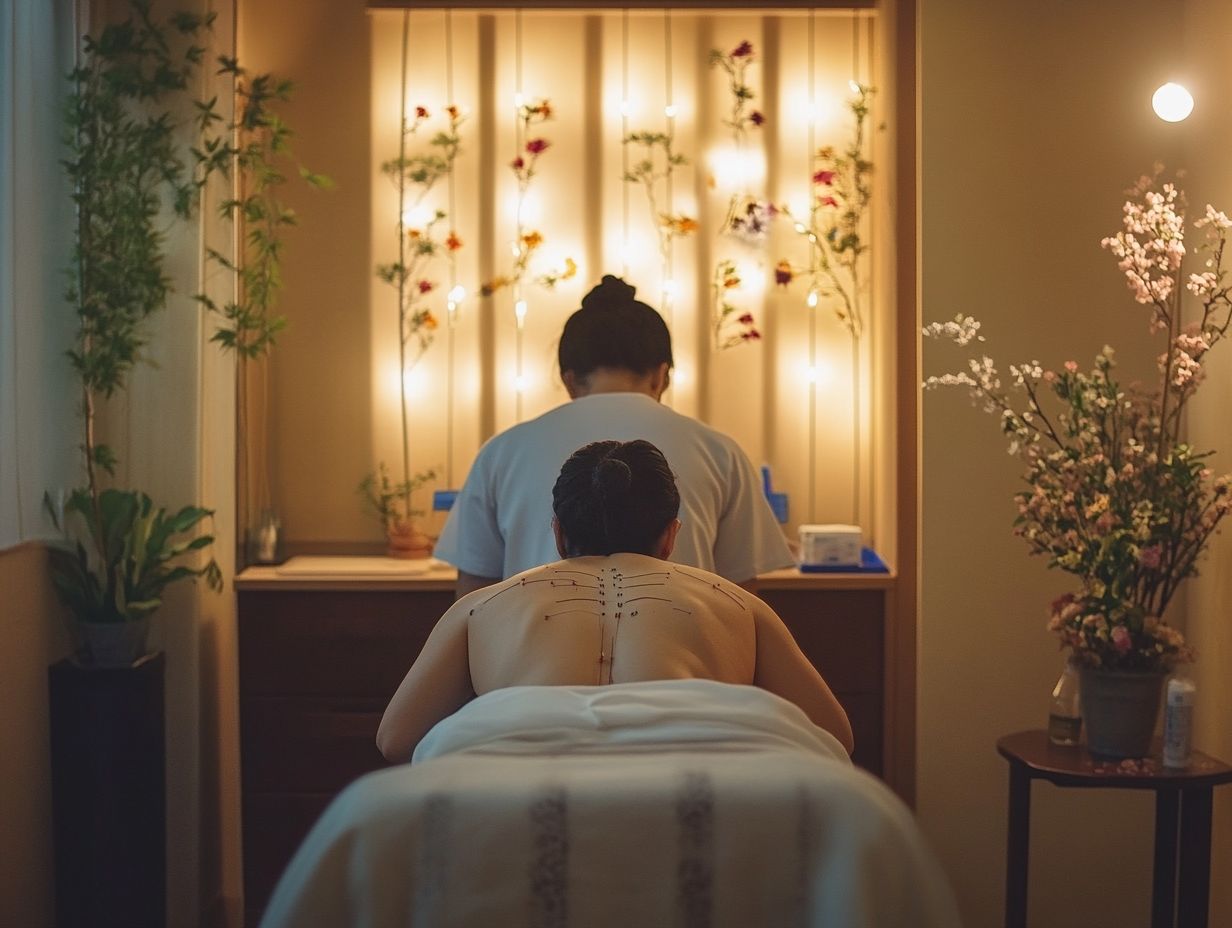
A wealth of research studies has established the effectiveness of acupuncture as a treatment for anxiety and related disorders. This affirms its significance within the realm of modern integrative medicine.
Research Studies and Findings
Various studies have uncovered significant findings regarding acupuncture’s role in treating anxiety disorders. These findings showcase its potential as a viable treatment option for you.
One notable study published in the Journal of Alternative and Complementary Medicine revealed that participants receiving acupuncture experienced a marked decrease in anxiety levels compared to those in a control group. Researchers, including Dr. Helene Langevin, emphasized that these results highlight acupuncture’s efficacy and its potential to complement traditional therapies.
Another significant piece of research discovered that regular acupuncture sessions can lead to long-term improvements in anxiety-related symptoms. This suggests that consistency is key to achieving optimal results.
Such findings greatly enhance our understanding of how acupuncture can be integrated into mental health treatment plans. This broadens the therapeutic options available for individuals seeking relief from anxiety.
Choosing an Acupuncturist
Selecting a qualified acupuncturist is crucial for ensuring safe and effective treatment for anxiety and other health conditions.
Licensed acupuncturists have the training and credentials necessary to deliver the care you deserve.
Qualifications and Credentials to Look For
When you re on the hunt for a licensed acupuncturist, it s essential to verify their qualifications and credentials. This guarantees a safe and effective treatment experience.
Start by looking into their educational background, which typically includes a master s degree in acupuncture or traditional Chinese medicine from a reputable institution. Many acupuncturists go above and beyond, earning various certifications that showcase their specialized skills and knowledge.
Don t overlook state licensing; it ensures that acupuncturists adhere to necessary regulations and ethical standards. To assess a practitioner s credentials, visit their website, check industry-related directories, and seek client testimonials.
Engaging in conversations with potential acupuncturists can provide valuable insights into their experience and approach. This helps you select a qualified professional who aligns with your specific needs.
What to Expect During an Acupuncture Session
During your session, you can anticipate a comprehensive assessment that delves into your unique needs. Following this, you’ll experience the gentle insertion of needles at specific points, meticulously chosen to promote healing.
Procedure and Potential Side Effects

The process involves the careful insertion of needles into specific points on your body. This practice is generally safe, though you may notice some mild side effects no worries, these usually fade fast!
Your acupuncturist will conduct a thorough assessment of your health history and current concerns. This ensures that your treatment is tailored just for you.
Once the session begins, the expert will identify the precise acupuncture points, blending traditional methods with modern techniques for optimal needle placement. As the needles are inserted, you may feel a slight prick usually brief due to the use of sterile, single-use needles that prioritize hygiene.
After the session, you might notice some common side effects, like slight bruising or soreness. Staying hydrated and resting can help manage any reactions effectively. This allows you to reap the full benefits of your treatment with minimal discomfort.
Combining Acupuncture with Other Treatments for Anxiety
By combining acupuncture with other complementary therapies, you can elevate your anxiety reduction strategies and enhance your overall mental health. This integrated approach offers a holistic path to treatment.
Ready to experience the benefits of acupuncture? Book your session today!
Complementary Therapies and Strategies
Complementary therapies like mindfulness, Qi Gong, and relaxation techniques enhance your acupuncture journey. They provide effective support for managing anxiety and its triggers.
Each of these holistic practices offers unique benefits. Mindfulness helps you better regulate your thoughts and feelings.
Qi Gong uses gentle movements and breathwork to harmonize your body’s energy, known as qi, promoting a deep sense of calm.
Relaxation techniques, such as deep breathing and progressive muscle relaxation, help reduce stress responses. Integrating these therapies with acupuncture tackles various aspects of your anxiety.
This creates a comprehensive and soothing treatment experience that resonates with your well-being.
Frequently Asked Questions
What is acupuncture and how does it work?
Acupuncture is a form of traditional Chinese medicine that involves inserting thin needles into specific points on the body to promote balance and healing. It is believed to stimulate the body’s natural healing processes and restore the flow of energy throughout the body.
Can acupuncture really help with anxiety?
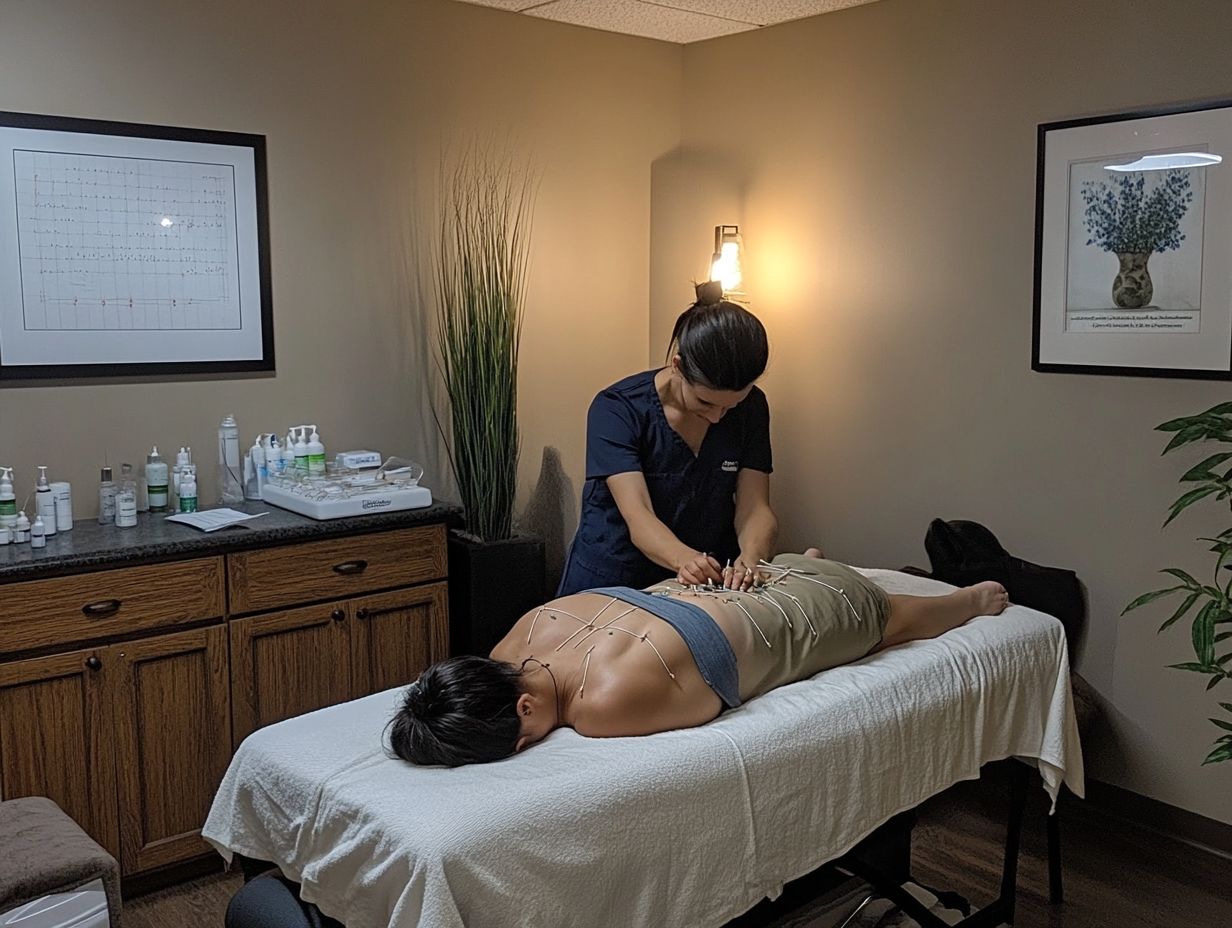
While research on acupuncture for anxiety is limited, there is evidence to suggest that it can be an effective complementary treatment. Most people feel significantly calmer after sessions, and some studies have shown a reduction in symptoms with regular treatment.
What are the potential benefits of using acupuncture for anxiety?
Besides reducing anxiety symptoms, acupuncture may improve sleep, reduce muscle tension, and promote an overall sense of well-being. It can also be a natural alternative to medication for those who prefer to avoid or supplement traditional treatments.
Are there any risks or side effects associated with acupuncture?
Acupuncture is generally considered safe when performed by a qualified and licensed practitioner. However, some people may experience mild side effects like bruising, soreness, or bleeding at the needle insertion sites. It is essential to receive acupuncture from a reputable practitioner to minimize these risks.
How many acupuncture sessions are typically needed to see results for anxiety?
The number of sessions needed varies depending on the individual and the severity of their symptoms. Some may experience improvements after just a few sessions, while others might require ongoing treatment for longer-lasting effects. It’s best to discuss your specific treatment plan with your acupuncturist.
Is acupuncture covered by insurance for the treatment of anxiety?
Unfortunately, acupuncture is not typically covered by insurance for anxiety. However, some plans may offer coverage as a form of pain management. It’s best to check with your provider to see if acupuncture is covered under your plan.
Don’t hesitate to reach out to a licensed acupuncturist to start your journey toward relief today!

